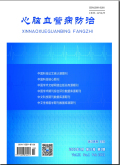心脑血管病防治2024,Vol.24Issue(7):27-30,47,5.DOI:10.3969/j.issn.1009-816x.2024.07.005
肝素结合蛋白、核因子κB亚基p65及神经元特异性烯醇化酶与心脏骤停患者预后的相关性
Correlation of heparin-binding protein,nuclear factor Kappa B p65 and neuron-specific enolase with the prognosis of cardiac arrest patients
摘要
Abstract
Objective To analyze the impact of serum heparin-binding protein(HBP),nuclear factor Kappa B(NF-κB)subunit p65 and neuron-specific enolase(NSE)on the prognosis of patients underwent cardiopulmonary resuscitation(CPR).Methods Patients who experienced cardiac arrest(CA)and were treated at the emergency intensive care unit of the Affiliated Hospital of Hangzhou Normal University from September 2020 to September 2022 were included.Afer CPR,patients who met the inclusion criteria and survived for more than 48 hours were included in the analysis.According to the Glasgow-Pittsburgh cerebral performance category(CPC)score at one month after admission,patients were divided into the good prognosis group(CPC score 1-2 grade)and the poor prognosis group(CPC score 3-5 grade).Gender,age,underlying diseases,and CA causes of the two groups were recorded.Peripheral blood samples were collected at five time points:immediately after return of spontaneous circulation(ROSC),and at 6,12,24,and 48 hours post-ROSC.Changes in serum HBP,NF-κB p65 and NSE were monitored.The correlation of HBP,NF-κB p65 and NSE with scores of acute physiology and chronic health evaluation(APACHE)Ⅱ and Glasgow Coma Scale(GCS)was analyzed.ROC curve analysis was performed to assess the impact of HBP,NF-κB p65,and NSE on the prognosis of CPR.Results Thirty patients successfully underwent CPR and survived for more than 48 hours,with 11 in the good prognosis group and 19 in the poor prognosis group.HBP,NF-κB p65,NSE and APACHEⅡ score in the poor prognosis group were significantly higher than those in the good prognosis group,and GCS score in the good prognosis group was significantly higher than that in the poor prognosis group,the differences were statistically significant(all P<0.05).HBP,NF-κB p65,and NSE levels,peaked at 6,12,and 24 hours post-ROSC after CPR.Serum HBP,NF-κB p65,and NSE were positively correlated with APACHEⅡ score(P<0.01)and negatively correlated with GCS score(P<0.01).ROC curve analysis showed that the AUC of HBP,NF-κB p65 and NSE for prognosis of CPR were 0.871,0.579 and 0.802,respectively,the sensitivity was 96.3%,81.1%and 93.8%,and the specificity was 91.1%,78.2%and 97.8%,respectively.These results indicated that HBP,NF-κB p65 and NSE can predict the prognosis of patients with CPR.HBP,NF-κB p65,and NSE collectively predicted poor CPR outcomes with AUC of 0.953 and sensitivity of 97.7%,surpassing individual indicators(P<0.05).Conclusion Post-CPR patients exhibit different degrees of inflammation and neural damage.HBP,NF-κB p65,and NSE can be used for early evaluation of the severity and prognosis of patients after CPR.Combined use of the 3 indicators enhances their predictive value.关键词
心肺复苏/肝素结合蛋白/核因子κB亚基p65/神经元特异性烯醇化酶Key words
Cardiopulmonary resuscitation/Heparin-binding protein/Nuclear factor Kappa B subunit p65/Neuron-specific enolase引用本文复制引用
苟涛,金晓宇,夏金明..肝素结合蛋白、核因子κB亚基p65及神经元特异性烯醇化酶与心脏骤停患者预后的相关性[J].心脑血管病防治,2024,24(7):27-30,47,5.基金项目
杭州市医药卫生科技项目(A20220070) (A20220070)

